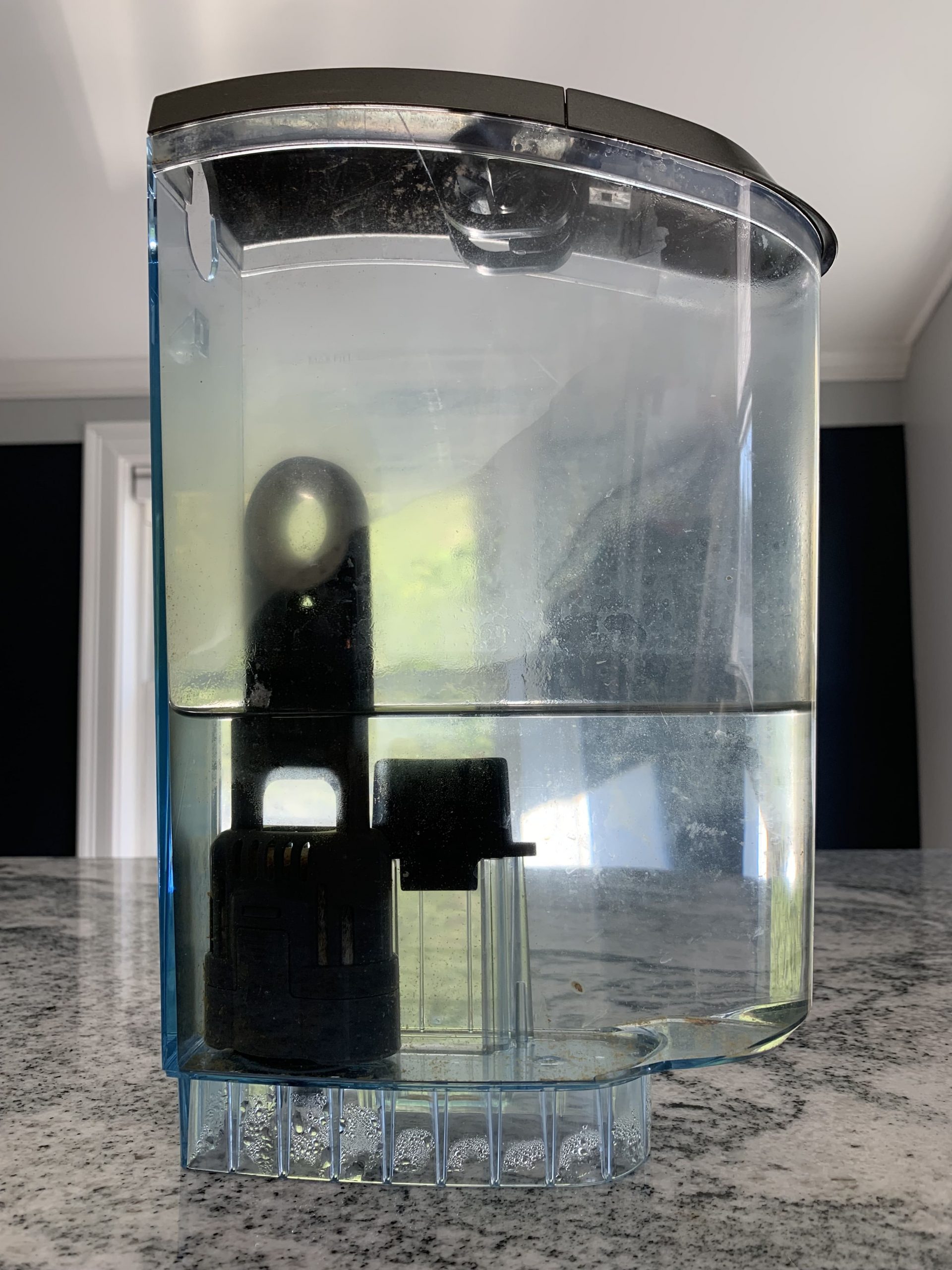Why You Should Not Use Distilled Water In Your Keurig

If you are a new owner of a Keurig coffee machine, you may be wondering about what type of water you can use to brew your K-Cups. If you don’t like the taste of your tap water or if you live in an area with hard water (meaning that is high in mineral content), you may think distilled water is better for your Keurig. After all, it is more cost effective than buying bottled filtered mineral water and easier than using a Brita or PUR home filter if you don’t have a filter built into your fridge. However, there are some important reasons why you may not want to use distilled water. Keep reading to learn more.
What Is Distilled Water?
Distilled water is made through a process called distillation. Water is boiled, the steam is collected and then the steam is cooled to turn it back into water. This process removes any impurities from the water. In addition, it removes more than 99% of the minerals that are naturally occurring in water that our bodies need.
Pros of Using Distilled Water To Make Keurig Coffee
Some people consider using distilled water because they think that the lack of minerals will mean less frequent maintenance for their machine. This line of thinking is especially common among people who live in areas where the tap water is very high in mineral content (called hard water). When you use tap or filtered water to brew a K-Cup, the water leaves behind some trace minerals. Overtime, these minerals can turn into limescale buildup. The harder your water, the more minerals that are left behind.
The only way to remove that buildup in your Keurig is by running a descaling cycle. This requires the purchase of a low cost solution for best results. Since distilled water has no minerals, it should mean that you would need to descale your coffee maker less frequently. While that may be true, there are some tradeoffs you will need to consider in the next section.
Cons of Using Distilled Water In Keurig Machine
Your Keurig May Not Work
The older and now discontinued Keurig 2.0 models with a touch screen display had built in sensors designed to detect minerals in the water in the reservoir. This is how Keurig 2.0 models detected if the water tank was empty or low. As a result, using distilled water in Keurig 2.0 machines would cause the brewer to signal that the water tank was empty even if it was full because the water has no minerals. Since then, Keurig is no longer building these sensors into its coffee makers. However, they still recommend against using distilled water noting that “the machine may not operate at its best.” More on why that may be below.
You May Damage Your Keurig
Because distilled water lacks any minerals, it tries to absorb them from anything it comes in contact with in order to try to achieve a chemical balance. As a result, if you use distilled water in your Keurig, it may absorb some chemicals from the plastic water tank or plastic parts inside your machine. Distilled water may also try to absorb minerals from any metal components inside your Keurig. As a result, this can cause corrosion that can damage your brewer and eventually make it unusable.
Your Keurig Coffee May Not Taste Great
Do you know why the quality of the water you use to brew coffee is so important? For starters, about brewed coffee is about 98% water. In addition, the minerals that are found in most types of water, especially magnesium, calcium and bicarbonate, help extract more taste from the coffee grinds in the K-Cup. That is why the choice of water you use is so important. Since distilled water loses its mineral content, using it in your Keurig may result in your K-cup coffee tasting a bit flat. You may enjoy the taste of your Keurig coffee more if you use tap or filtered water.
Should You Use Distilled Water In A Keurig?
Unless you have a Keurig 2.0, technically nothing is stopping you from using distilled water in your brewer. However, the potential damage it may cause to your machine and the negative impact it may have on the taste of your coffee, and possibly your health, I would recommend against it. Keurig does too. Check your user manual.
Alternatives To Distilled Water
Instead of using distilled water, I recommend using home filtered water or tap water if you do not live in a hard water area. Alternatively, you can use bottled mineral spring water or purified water like Dasani or Aquafina. However, using bottled water can get expensive. It also isn’t great for the environment because of all of the plastic. If you have hard water, I would strongly recommend using bottled mineral water or home filtered water.
Don’t Forget About Your Water Tank Filter
Most Keurig coffee brewers have a charcoal water filter. A charcoal filter will help remove chlorine, calcium and other impurities from your water. I would strongly recommend using a Keurig filter if you have hard water, but it can’t hurt to use it even if you have soft tap water or are using filtered water. Water filters should be replaced every two months or 60 tank refills. It’s best to set a reminder for 60 days once you swapped yours. However, if you use your machine multiple times a day, you may want to consider a more frequent replacement schedule.
Keurig-branded water filters usually only cost between $1.50 and $3.50 per cartridge. Plus, there are many starter kit options to choose from. A two pack will last you four months, a six pack will last for one year, and a 12 pack will last for two years.


